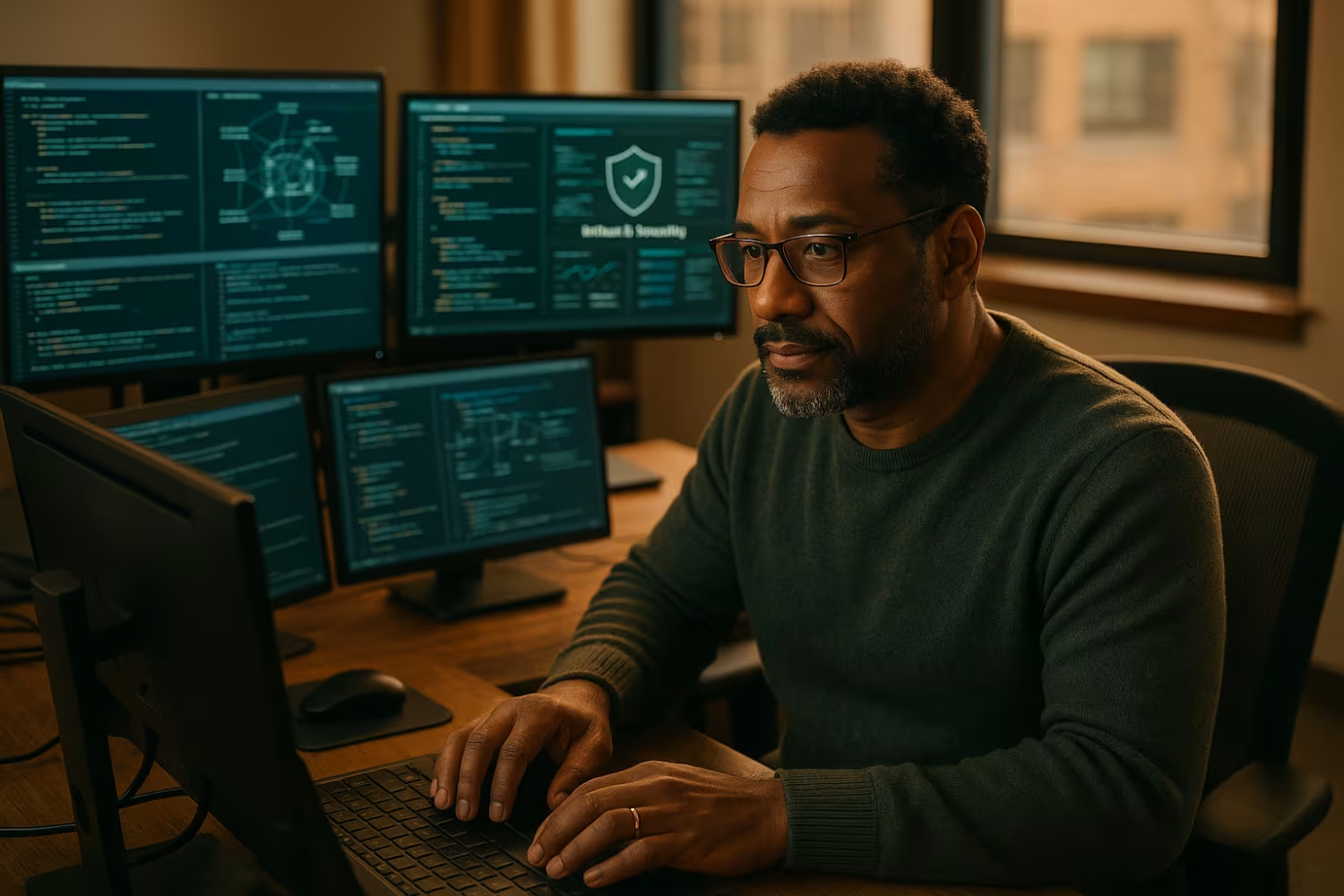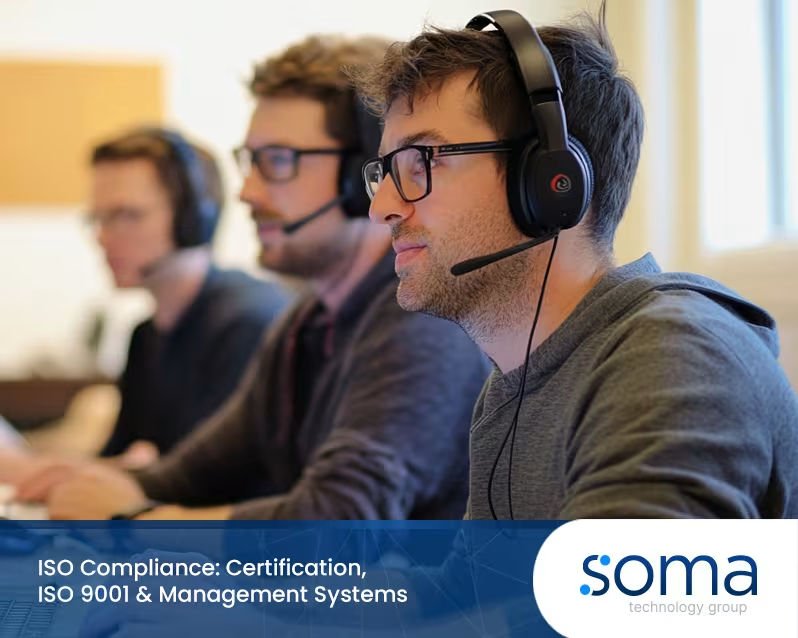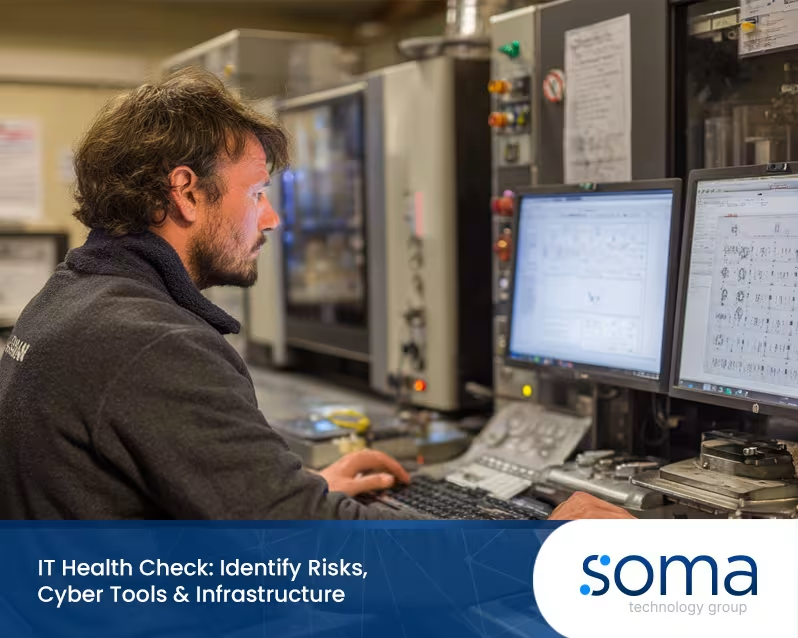
IT Security Specialist Role: Skills, Career Path & Tools
Businesses are under constant pressure to protect sensitive data and maintain secure systems. That’s why the role of an IT security specialist is more important than ever. In this article, you’ll learn what this role involves, the skills needed, common mistakes to avoid, and how to build a successful career in this field. We’ll also cover how organisations can benefit from hiring professionals in IT and cyber security, and what job seekers should know about entering this growing industry.
What does an IT security specialist do?
An IT security specialist is responsible for protecting an organisation’s digital assets. This includes identifying threats, securing networks and systems, and ensuring that data remains safe from unauthorised access. They often work closely with IT teams to implement security protocols and respond to incidents quickly.
These professionals are vital in maintaining a secure environment for businesses. They help prevent data breaches, reduce downtime, and ensure compliance with industry regulations. In regions like Australia, where data privacy laws are strict, having a skilled security specialist is not just a bonus—it’s essential.

Top mistakes to avoid when hiring or becoming an IT security specialist
Hiring or becoming an IT security specialist involves more than just technical know-how. Here are some common pitfalls to watch out for:
Mistake #1: Ignoring soft skills
Technical skills are important, but communication and problem-solving are just as critical. Security specialists often need to explain risks to non-technical staff or work across departments.
Mistake #2: Overlooking continuous training
Cyber threats evolve constantly. If you’re not updating your skills regularly, you risk falling behind. Employers should support ongoing training and certifications.
Mistake #3: Not aligning with business goals
Security isn’t just an IT issue—it’s a business one. Specialists must understand the organisation’s goals to create effective security strategies.
Mistake #4: Focusing only on external threats
Internal risks, like employee errors or poor access controls, can be just as damaging. A balanced approach is key.
Mistake #5: Underestimating compliance requirements
In Australia, compliance with data protection laws is mandatory. Ignoring these can lead to fines and reputational damage.
Mistake #6: Using outdated tools
Relying on old software or hardware can leave gaps in your defences. Regular audits and updates are necessary to stay secure.
Mistake #7: Skipping incident response planning
When a breach happens, time matters. Without a clear response plan, recovery takes longer and costs more.
Key benefits of hiring an IT security specialist
Bringing in a qualified IT security specialist offers several advantages:
- Reduces the risk of data breaches and cyber attacks
- Ensures compliance with local and international regulations
- Improves response time to security incidents
- Helps maintain customer trust and brand reputation
- Supports internal IT teams with expert guidance
- Provides tailored solutions based on your organisation’s needs

Understanding the IT security management system
An IT security management system is a structured approach to managing sensitive company information. It includes policies, procedures, and controls designed to protect data and systems. This framework helps businesses identify risks, implement protections, and monitor ongoing performance.
Having a system in place also makes it easier to meet compliance standards. It ensures that security isn’t just reactive but part of everyday operations. For growing businesses, this proactive approach helps reduce long-term costs and improves resilience.
Steps to build a career pathway in IT and cyber security
If you're considering a career in IT and cyber security, here’s how to get started and grow:
Step #1: Start with foundational education
A diploma or degree in Information Technology or a related field gives you the basics. Look for courses that include networking, systems, and security modules.
Step #2: Gain hands-on experience
Entry-level roles like IT support or junior analyst positions help you understand real-world systems and threats. Practical experience is highly valued by employers.
Step #3: Earn industry certifications
Certifications like CompTIA Security+, CISSP, or CEH show that you meet global standards. They also help you specialise in areas like penetration testing or risk management.
Step #4: Develop a specialty
Over time, you may focus on specific areas like cloud security, threat analysis, or compliance. Specialising can open doors to higher-level roles.
Step #5: Build a professional network
Join local IT groups or attend industry events. Networking helps you stay updated and find new opportunities.
Step #6: Stay current with trends
Cyber threats change fast. Subscribe to security blogs, attend webinars, and take short courses to keep your skills sharp.
Step #7: Seek mentorship or guidance
Learning from experienced professionals can speed up your growth. Don’t hesitate to ask for advice or feedback.

How to implement a secure network and IT security strategy
Creating a secure environment starts with understanding your current risks. Begin by conducting a full audit of your systems and networks. Identify weak points, such as outdated software or poor access controls.
Next, develop a layered security strategy. This includes firewalls, antivirus software, encryption, and employee training. Make sure your IT security management system is documented and regularly updated.
Finally, test your defences. Run simulations or hire ethical hackers to find gaps. Regular testing ensures your systems can handle real threats.
Best practices for maintaining a secure environment
Keeping your systems secure requires ongoing effort. Here are some best practices:
- Update software and systems regularly to patch vulnerabilities
- Use multi-factor authentication for all critical accounts
- Limit user access based on job roles
- Train staff to recognise phishing and other scams
- Monitor network activity for unusual behaviour
- Back up data frequently and store it securely
Consistent action helps reduce risk and keeps your organisation protected.

How soma technology group can help with IT security specialist
Are you a business with 20 or more employees looking to improve your IT and cyber security? Our team works with growing organisations to build reliable, secure systems that protect your data and support your goals.
We understand the challenges of managing network and IT security while running a business. That’s why we offer tailored solutions, from audits to full system management.
Frequently asked questions
What skills should an IT security specialist have?
An IT security specialist should have both technical and soft skills. Technical skills include knowledge of firewalls, intrusion detection systems, and encryption tools. Soft skills like communication and problem-solving are also essential.
Employers in Australia often look for candidates with experience in information technology, infrastructure, and support. Having a strong understanding of data protection laws and compliance standards is also important.
How does the role of a security specialist differ from other IT roles?
Unlike general IT roles, a security specialist focuses solely on protecting systems and data. They identify vulnerabilities, respond to threats, and ensure compliance with security policies.
This role often involves working with other departments to implement secure practices. It’s a key position in any organisation that values data security and system reliability.
What is the career outlook for cyber security professionals?
The demand for cyber security professionals is growing rapidly. As more businesses move online, the need to protect digital assets becomes critical.
In Australia, this career path offers strong job security and competitive salaries. Many employers are actively seeking skilled professionals to fill these roles.
How do I start a career in IT and cyber security?
Start by studying information technology or a related field. Then, gain experience through internships or entry-level roles in IT support or systems administration.
Certifications like CompTIA Security+ or CISSP can boost your credentials. Building a career in this field takes time, but the opportunities are worth it.
Why is it important to maintain a secure IT environment?
A secure IT environment protects your organisation from data breaches, financial loss, and reputational damage. It also ensures business continuity during unexpected events.
Maintaining security involves regular updates, staff training, and monitoring. It’s not a one-time task but an ongoing responsibility.
How can job seekers stand out in the IT security field?
Job seekers can stand out by gaining hands-on experience, earning certifications, and staying updated on industry trends. Volunteering for IT projects can also help.
Employers value candidates who show initiative and a willingness to learn. Being proactive about your career development makes a big difference.
.svg)
.webp)


